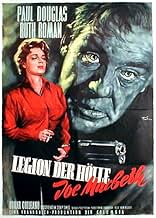Before his befuddled attempt to rework Shakespeare's tragedy into an urban mob movie, Philip Yordan had more than an honorable career as a screenwriter: When Strangers Marry, Whistle Stop, Suspense, The Chase, Reign of Terror, Edge of Doom, Detective Story, Johnny Guitar, The Big Combo (to cite only titles in or near the noir cycle). Perhaps Joe Macbeth's production in the United Kingdom proved the impetus for its being adapted from the ill-starred 'Scottish play,' adding one more element originating in Great Britain to satisfy all the codicils in the deal. But Yordan's writing is far from the major shortcoming in a movie that, despite occasional spurts of interest, falls short of satisfying.
For starters, it's hard to buy the usually sympathetic Paul Douglas as a plausible pretender to the throne, even a weak-kneed and vacillating one (Douglas was nearing 50 as well as the end of his life at the time). True, his striking at the king is prompted (if not prodded) by his ambitious wife Ruth Roman, here steely and matronly (she was a sadly underused actress). But both are upstaged by Bonar Colleano as a smoldering agent of revenge and retribution in much too underdeveloped a role.
Then, the milieu, which seems to be New York City and an estate on Long Island, strikes an inauthentic note, having been filmed on sound stages across the big pond (the street scenes are shabbily Victorian rather than raffishly New World). In a genre where atmosphere ought to be preeminent, Joe Macbeth stays imprecise and generic.
Last, the direction fell to the workmanlike Ken Hughes, who had some experience in British suspense thrillers, including some that might now be termed 'Britnoir:' The House Across The Lake and The Long Haul are two of the more notable of them. But he really doesn't have much to bring to the party, and once or twice stoops to low-comedy touches grindingly at odds with the tone of the movie.
The most arresting aspect of Joe Macbeth (and aspect, alas, which becomes an albatross), is a misguided fealty to the Bard of Avon. Lest anyone overlook its Elizabethan pedigree, Joe Macbeth piles on the homages. Banquo becomes 'Banky' (the ever watchable Sid James) and MacDuff 'Duffy;' the three witches are downsized to one, a has-been actress reduced to telling Tarot cards (Minerva Pious, in a delightful turn; her cauldron becomes a kettle where she boils chestnuts on a pushcart); we even have Roman doing the 'Out, damned spot' scene (luckily, Douglas was spared 'Tomorrow and tomorrow and tomorrow'). The trouble is, when you start noticing all the literary allusions and waiting for the next one to pop up, the movie you're watching has ceased to engage you on its own terms. Nice try, but no cigar.



















